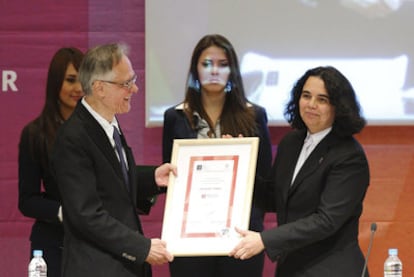Drugs war encroaches on Guadalajara International Book Fair
Bound and gagged bodies found just streets away from event venue
The 25th annual Guadalajara International Book Fair opened in Mexico's second-largest city on Saturday, as the country's ongoing war between the major drug cartels brought violence to its doorstep.
The book fair opened just two days after the discovery of the bound and gagged bodies of 26 young men only a few streets away from the literary event's venue. The bodies were found in several trucks, abandoned around the western city's iconic Millennium Arches monument, together with a message from drug cartels.
With 2,000 publishers bringing nearly 400,000 titles, FIL, as it is known in Spanish, is the biggest literary event in the Spanish-speaking world, and is expected to draw as many as 600,000 visitors until it closes on December 3.
The inauguration focused on the FIL Award for Literature in Romance Languages to Colombian writer Fernando Vallejo. The 68-year-old Vallejo is best known for Our Lady of the Assassins, set against the background of the drugs war that ripped Colombian society apart in the 1980s and 1990s, and which was made into a feature film by French director Barbet Schroeder in 2000.
The jury honored Vallejo for being "one of the most personal, controversial and exuberant voices in current Spanish-language literature."
Presenting the award to Vallejo, EL PAÍS' Juan Cruz described Vallejo as "a man who writes to annoy the hypocrites of society, and whose life has been dedicated to two causes: the defense of animals and a love of the Spanish language."
Vallejo told AFP he was "very honored" by the jury's decision and would donate the money to animal protection groups.
The opening was attended by Nobel laureates Mario Vargas Llosa, from Peru, and Germany's Herta Müller. Germany will be the national guest of honor.
Raúl Padilla López, President of FIL Guadalajara, said: "Germany is a country of ideas and books. It is a country that, through its complex history, has learned the value contained in books, their ability to create other worlds and influence our reality. In consequence, it is home of the Frankfurt Book Fair, the most important of its kind, a constant inspiration and reference for our Fair since its creation. And it will be an honor to welcome it as our very special guest in 2011, year of our 25th anniversary."
Guadalajara sits on the main highway running through western Mexico from the methamphetamine-producing state of Michoacán north toward the Pacific Coast state of Sinaloa.
Police say the killings last week could mark a new stage in the full-scale war between the country's two main drug cartels, Sinaloa and the Zetas. In recent months, security officials and analysts have become concerned that the city could be a target for the Zetas, which have rapidly expanded since breaking with their old allies in the Gulf cartel in 2010.
But the killings have so far failed to generate debate within the book fair. Vallejo mentioned the issue in passing while receiving his award, blaming the former ruling PRI party, which ran the country for 70 years following the Mexican Revolution: "The PRI sowed the seeds for the drug cartels to operate," he said.
The highlight of the inauguration, a conversation between Vargas Llosa and Müller, was an opportunity for the two heavyweights to discuss their thoughts on the writing process, as well as touching on the role of literature "as an instrument of progress and liberty."
"Literature is unsettling, that is why it has always been regarded as suspect by regimes that want to control the lives of people from the cradle to the grave," said Vargas Llosa.

Tu suscripción se está usando en otro dispositivo
¿Quieres añadir otro usuario a tu suscripción?
Si continúas leyendo en este dispositivo, no se podrá leer en el otro.
FlechaTu suscripción se está usando en otro dispositivo y solo puedes acceder a EL PAÍS desde un dispositivo a la vez.
Si quieres compartir tu cuenta, cambia tu suscripción a la modalidad Premium, así podrás añadir otro usuario. Cada uno accederá con su propia cuenta de email, lo que os permitirá personalizar vuestra experiencia en EL PAÍS.
¿Tienes una suscripción de empresa? Accede aquí para contratar más cuentas.
En el caso de no saber quién está usando tu cuenta, te recomendamos cambiar tu contraseña aquí.
Si decides continuar compartiendo tu cuenta, este mensaje se mostrará en tu dispositivo y en el de la otra persona que está usando tu cuenta de forma indefinida, afectando a tu experiencia de lectura. Puedes consultar aquí los términos y condiciones de la suscripción digital.








































